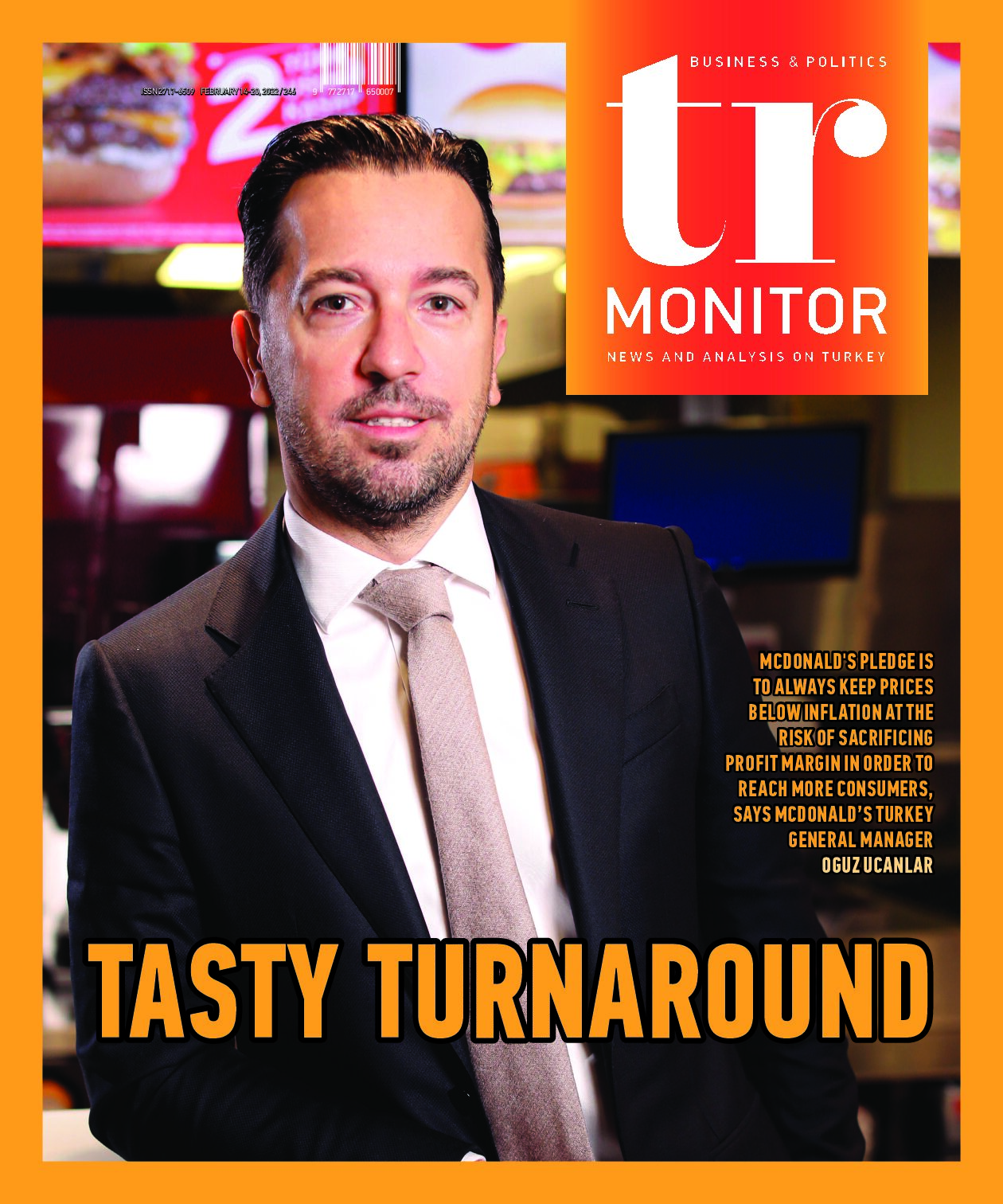By HUSNIYE GUNGOR
The year is 1986 in Taksim, Istanbul. The first McDonald’s restaurant opens on Istiklal Street, the main cultural and entertainment district of the city. Hundreds of young people from other cities came to Istanbul with organized ‘hamburger tours’ to experience this famous American way of eating. The Taksim restaurant even received visitors from Bursa, a city known for its Iskender Kebap, where McDonald’s Turkey General Manager Oguz Ucanlar was living at that time. He could not make the tour due to his age but he remembers the craze at his school amongst older students. Ucanlar also remembers the early years of his GM role at McDonalds – the turnaround strategy he applied at that time is still used. Minor changes have been made due to the difficulties of the current business environment under macroeconomic pressures. “Otherwise it would be boring,” he said referring to the year 2022, which started with uncertainty.
McDonald’s has been operating as a 100% Turkish company under Anadolu Group since 2005, with nearly 250 restaurants in 42 cities employing nearly 7,000 people. Oguz Ucanlar, who joined the group as retail group director in 2013, took the GM role in 2016 after overseeing Turkey operations for McDonald’s between 2014 and 2016.
The operation director role enabled him to see the purchase, restaurant leasing, employee profile, financial structure, and marketing processes of McDonald’s Turkey. That’s how he developed a strategic turnaround plan to address the needs and problems experienced by the organization.
Ucanlar said they identified three main building blocks that they have to be very good at: cost-effective production, selling at affordable prices with the right communication, and doing all of these with the right team of colleagues. “We developed our 98% supply local supply chain by adding new partners to our existing suppliers, which were already over 100. We purchase more than 600 different goods from them,” Ucanlar said. He said they began seeing positive results within a year.
The second biggest expenditure item was restaurant leases. At the beginning of 2016, shopping malls had already seen their heyday, when retailers were competing with each other to get a place at shopping malls. Seeing this opportunity, Ucanlar and his team met with all of the McDonald’s landlords, individual or corporate, to review renting terms, especially for loss-making restaurants.
“We continued on new terms with those who accepted, parted ways with others, and closed nearly 60 stores,” Ucanlar noted.
Reducing the number of restaurants increased the company’s profitability. Now it was time to reflect this cost advantage on the consumers via affordable products, starting with reducing the price of the Big Mac menu by 30%. It may be an American-origin product but the primary consumer is young Turks, for which an affordable price has always been very important, according to Ucanlar. “We ran a communication campaign which responded to their needs and underlined the affordable prices for three years,” he said.
Working for the youth
McDonald’s was a brand that was accessible, sensible to consumers’ price expectations, and understood how hard it is to be a young person economically in today’s conditions. Communications were developed accordingly and consumers were told that “McDonald’s was working in their favor.”
This communication increased the number of customers in four years from an average of 193,000 orders annually in one restaurant to 308,000. As the number of customers is calculated by multiplying the orders by 1.8, an average of more than 554,000 customers visited restaurants each year. It went so well that McDonald’s Turkey became the country with the fastest growth in the number of customers among 119 McDonald’s countries in 2017, a time when things were not easy at all given the Syrian War, the issue of Russian planes, and the tourism crisis caused by the coup attempt.
The third pillar of the turnaround strategy was the new language spoken within the company. Employees who insisted on doing the job as they used to either had to change their way of doing business or parted ways with the company. “Our cadre in the central office was reduced and a fast, dynamic, energetic, and take-charge team that does not hesitate to question the status quo was established at every level,” he explained. The process took seven months in 2016.
A new version, the same strategy
2022 poses new challenges for MacDonald’s Turkey General Manager Oguz Ucanlar – it’s not simply a flashback to 2016. He reflected on this with regards to the company’s positioning for 2022 in an inflationist economic environment, where the purchasing power of Turkish customers is getting lower with increasing unemployment, especially among young people.
“We are applying a different version of this strategy for the coming period,” he noted, adding that McDonald’s Turkey had the best turnover and achieved the highest profitability in its history in 2021, a year that was a perfect storm with new variants of COVID-19, shutdowns, wars, bombings, devaluation of the Turkish Lira, the currency crisis, and inflation. The company increased its EBITDA rate to 10%, paid off all its debt, and the balance sheets were positive by the end of the year.
“We realized 120% of what we dreamt of,” Ucanlar said, stressing that this has proved the ‘80-20 rule,’ also known as the Pareto Principle, which identifies inputs that are potentially the most productive and makes them the priority.
The right working culture was established in the company within six years under Ucanlar’s leadership, but there is a long way to go. The customer figures for 2019 have not been achieved yet, he says. However, McDelivery figures more than doubled in numbers compared to 2019 due to lockdowns during the pandemic. The daily average delivery figure today is 37,000, a figure originally projected for 2025. McDonald’s has been delivering food since 2002, so the experience and infrastructure were there, communication channels were simply shifted to this segment of the business. The only difference is that today McDelivery directly reports to the general manager and a digital customer director was assigned to the marketing team to further develop the business by analyzing customer decisions.
Looking at the year ahead, Ucanlar said that they have a team that will take immediate steps with gusto even if the unexpected arises, which he finds relieving. McDonald’s Turkey will sell the highest quality products at the highest numbers with the most affordable prices, he says. “We have the power and promise for this,” Ucanlar added.
“Our prices will always remain below inflation. We will sacrifice our margin to reach more consumers, but we will not impose more prices on them. 2022 started with uncertainty and the difference between D-PPI and CPI will force us to modify,” he said, adding that this will not be a comfortable year, but would be boring if it were.
McDonald’s Turkey will have new restaurant openings, four of which are already finalized. “However, they won’t be perfunctory or for an increased turnover. We will choose the points where we can make sustainable money for each everybody. We have no plans to downsize or shut down restaurants.”
Creating advantages for women
>> McDonald’s Turkey has been attracting attention with its efforts to increase women’s employment since 2015. The company focused on employing a minimum of three middle-aged and older women, some of whom are mothers and housewives, in each restaurant. McDonald’s Turkey also implemented the Hanimeli incentive program in 2018,
>> “Women Driver” project prioritizes women when hiring motor drivers for the McDelivery service.
>> 33% of the total number of employees of McDonald’s Turkey, which has 60% female senior managers, are female. The target is to increase the female employment rate to 51% by the end of 2023.
>> McDonald’s Turkey is the ‘taste sponsor’ of the National Men’s and Women’s Football Teams as a result of an agreement signed with the Turkish Football Federation (TFF) in August 2020. The company supported the live broadcast of the matches played by the National Women’s Football Team to inspire them and change the perception that football is not suitable for women.
>> The company also supports the National Women’s Volleyball Team.
>> With the belief that awareness of gender equality will be based on education received in childhood, the company donated all of its revenue from sales on mcdonalds.com.tr and the McDonald’s mobile application to The Mother-Child Education Foundation (ACEV) on International Women’s Day last year.
By the numbers
- 250: The number of McDonald’s restaurants in 41 provinces in Turkey, employing nearly 7,000 people.
- 98%: the ratio of products and services supplied by Turkish manufacturers.
- 52%: The rate of increase in female employment in the last 5 years.
- 1 billion: The number of hamburgers sold in Turkey in 2017, when McDonald’s Turkey grew by 15%, becoming the fastest growing country in customer numbers of 119 countries.
- 5 million: The number of people who downloaded the McDonald’s global application immediately after it was launched
- 35%: The share of online sales (McDelivery), which doubled in 2020. McDonald’s Turkey has the highest increase in McDelivery (take-away) sales in the Middle East and Africa (MEA) region.
- 69%: 2021 growth in Like for Like (LFL) sales. Customer growth was 16% in the same period.
- TRY 1.7bn: 2021 turnover










